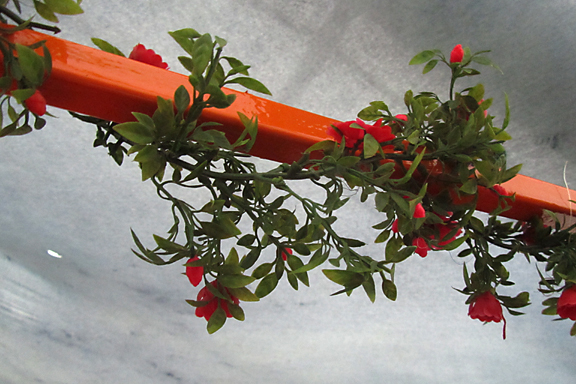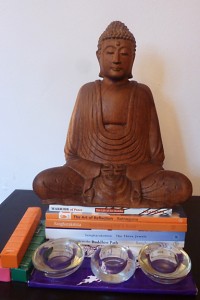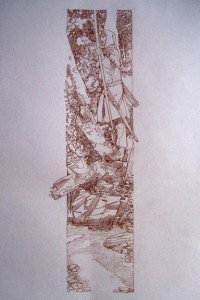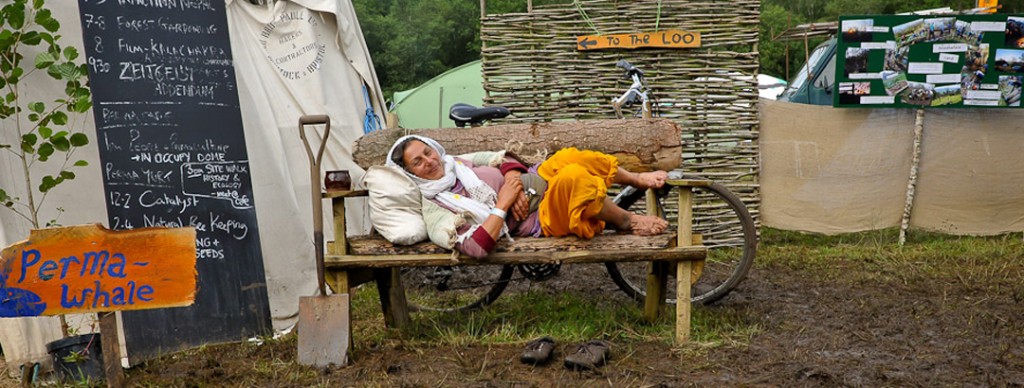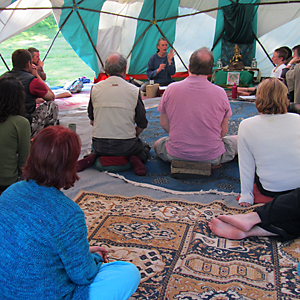Monday 16 June—Sunday 22 June 2014 led by Abhayajit and Khemajala
More information and booking on the main Buddhafield website.
This is the latest in a series of retreats led by me along with various friends and following on thematically from previous years’ Land, Body and Soul events. During the Soul and the Solstice, we’ll be doing something a little different from last time, although we’ll be developing themes we touched on last year. The main difference is that we will spend at least a couple of hours each day in a group process facilitated by Khemajala and myself who are both qualified Counsellors. Of course The event will also feature activities familiar to Buddhafield regulars such as meditation and ritual, along with great organic food and a friendly atmosphere.
So I guess some of you are thinking, what’s a group process? Well in this context it will involve led excercises, perhaps involving a combination of Meditation and Visualisation and often culminating in sharing our experiences in small groups — or we might do something completelly different; expect the unexpected! The general point of all the excercises is to bring us into closer contact with our own experience which may at times be challenging, but also I hope fun.
When I realised the dates for this event coincided with the Solstice, it seemed obvious to take the summer light as our inspiration and explore what it really means to feel fully alive and paradoxically the connection of that experience to darkness and death (the moment the summer light and it’s associated energy and abundance peaks, we begin the slow descent into darkness). This is of course a cyclical way of viewing things and from this perspective we can see our own lives as a cycle moving through periods of light and dark much like the seasons. The more linear way of looking at our lives is that of a progression that moves out of the dark and into the light, leaving despair behind us as we move ever upwards towards our goals and dreams. Yet how would it be if we accepted that darkness and the so called dark emotions must always play a part in our lives and if we do not pay them due respect they will pull down the edifices we have built around them.
We come from a society where everything is about change, transformation and self improvement, the youngster experimenting with drugs, the athlete training to their limit or the middle classes moving up the property ladder are all seeking to improve or change their experience and we might wonder about these routes to happiness. Yet in a culture dominated by these transcendent values, do we really need more of the same when we come to making meaning of our lives? Throughout time mankind has been overcoming itself and as valuable and necessary as that has been, the more feminine yet equally important values of self-acceptance and self-forgiveness have often been lost sight of. So the emphasis on this retreat will be less about overcoming the darkness and moving towards the light and more about accepting that both light and darkness, joy and despair will enter into our lives at various times.
So I suppose I am talking about how we learn to accept and make meaning of the uncertainty that impermanance bestows upon us and say yes to all our experience. For many saying yes to the joy of life might be easier than saying yes to the depths of despair! yet at the heart of Buddhist practice lies the practice of equanimity which means being open to all our experience. I guess the key to a lot of this stuff is openess to who we are and that often involves loosening our identities and suspending some of our bigger ideas for a while whilst we start exploring what is really close to us.
As David White says in the first verse of a Poem entitled Start close in:
Start close in,
don’t take the second step
or the third,
start with the first
thing
close in,
the step
you don’t want to take.
That last line is significant to me as we often resist doing things that invite us to ”start close in“ yet time and time again find that’s where the gold is. So if this appeals you are very welcome to come and join us at Beautiful Broadhembury and ‘start close in’.
Activities will be tailored to allow people to work at a pace that is comfortable for them and there will of course be plenty of time for relaxing in the long and hopefully warm days leading up to the Summer Solstice.
We’ll also have three sessions of led dance during the retreat, which I’m sure will be very pleasurable and help to bring us more into our bodies.
The interactive nature of this event will allow plenty of fun, as well as at times being challenging: it will not suit everyone and if you have concerns (about your mental Health for example) please contact me by email or 01363 772939.

 The Camp will feature a workshop programme of green crafts, offering the chance to make something beautiful with our own hands and learn new but traditional skills; social change workshops and ecology talks, helping us to face difficult truths about ourselves and the world; Meditation, Rituals and Dharma talks giving us the spiritual context in which to explore those truths and help us grow and change together. We all can become what the world needs now — alive, aware, in touch with the earth, connected.
The Camp will feature a workshop programme of green crafts, offering the chance to make something beautiful with our own hands and learn new but traditional skills; social change workshops and ecology talks, helping us to face difficult truths about ourselves and the world; Meditation, Rituals and Dharma talks giving us the spiritual context in which to explore those truths and help us grow and change together. We all can become what the world needs now — alive, aware, in touch with the earth, connected.
